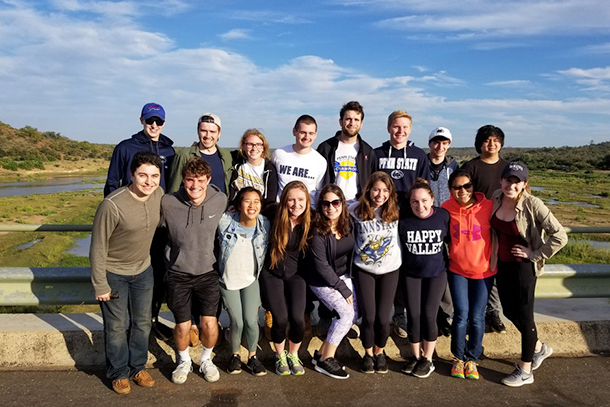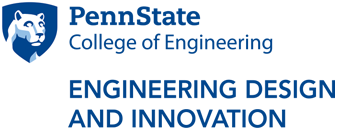
After participating in ELD's pilot coaching program, students traveled to Belgium Campus, an IT university in Pretoria, South Africa, meet their virtual counterparts and to present product prototypes to local South Africans.
Cultivating leadership potential
Engineering Leadership Development students improve South African smart-farming projects through career coaching strategies
08/02/18
UNIVERSITY PARK, Pa. — As the importance of leadership, coaching and mentorship skills grows in the engineering industry, Penn State's Engineering Leadership Development (ELD) program continues to innovate how it delivers content and concepts to its students.
Recently, ELD piloted an opportunity for its upper-level students to develop coaching skills while exposing its younger students to the value of being coached. Students who had taken ENGR 422: Leadership of International Virtual Engineering Teams in a previous semester were eligible to serve as coaches for students enrolled in the spring 2018 section of ENGR 422.
According to Meg Handley, associate director of engineering leadership outreach and assistant teaching professor, employers are asking for students to be exposed to coaching during their undergraduate experience.
“Employers are using more and more training programs to develop coaching skills in their leaders. Some leadership competency models are also suggesting coaching skills for competent leaders and managers,” she said. “They [employers] ask ‘are they [the students] coachable?’ meaning, ‘can they [students] accept feedback, learn from it and adapt to improve?’”
As part of the ELD coaching program, students are taught powerful questioning techniques, active listening skills and goal and action-item setting. When meeting with their teams, the student coaches use these developing leadership skills to educate team members on the best ways to approach their South African smart-farming projects.
“[Our coaches] practice applying powerful, open-ended questions that force the student leaders to think about and come up with their own conclusions on how to move forward to accomplish the tasks of the project,” Handley said.
Each coach served two teams individually and co-coached a third team with another student coach. Teams worked on projects centered around aquaponics, automated greenhouses and an irrigation system.
“Coaching the [ENGR] 422 teams was a very challenging but rewarding experience. It puts you in a unique position. You are there to help and guide a group of students,” Delaney Padgett, class of 2018 in civil engineering, said. “Combining the coaches past experiences and knowledge with the new ideas of the teams really made the projects innovative and successful. I feel very fortunate that I was able to be a coach and be involved in this new part of the program.”
Handley said coaches pushed student teams to dissect their projects and their decisions in order to come up with their own conclusions and to move forward with their projects.
“[Coaches] were there to support, provide guidance and ultimately practice developing others as leaders through coaching techniques — a key aspect of leaders in the workplace,” Handley said.
After asking open-ended questions to help teams navigate their way through their projects, coaches followed up by asking about action steps to accomplish tasks or to address issues.
“They were essentially there to point us in the right direction and mocked what a manager or leader would do in the engineering field. This type of curriculum is not something that can be taught to us. It is something that one must learn through experience,” Julia Sherwin, a rising senior in chemical engineering, said. “No matter how short-term these projects may seem, they teach many important lessons — communication and international disciplinary — that can be used throughout industry as one advances their career.”
According to Melissa Martin, a rising senior in mechanical engineering, the coaching program also helps engineering students get to know themselves and how they interact and perform in real-life situations.
“This experience allows students to take the time to evaluate themselves regularly,” she said. “Constant evaluation and feedback promote students to perform to their best ability while developing important skills necessary for success.”
In addition to encouraging students to think deeply about technical solutions, the ELD coaches assisted students to meet the challenges they faced while working virtually with their international team members. Each team worked with students from Belgium Campus, an IT university in Pretoria, South Africa. The coaches helped ENGR 422 students develop critical thinking around the design process and deal with interpersonal issues common to virtual, cross-cultural teams such as poor communication, misunderstanding of non-verbal cues and misunderstanding of cultural norms. These types of issues can lead to interpersonal conflict when working in cross-cultural virtual teams.
“The ENGR 422 curriculum was designed to build knowledge and skills in cultural awareness, communicate across cultures, and learn strategies for leading virtual teams,” Mike Erdman, Walter L. Robb Director of Engineering Leadership and Development and professor of practice in engineering leadership and engineering science, said. “Our students had the opportunity to practice what they learned in the class and were supported and encouraged by our coaching model.”
The culminating course experience saw student teams travel to South Africa to meet with their virtual counterparts at Belgium Campus. Students designed physical prototypes paired with software to provide automated solutions for their South African clients.
Member of the aquaponics team presented their prototypes to Ricalise Reubecke, a 16-year old South African dedicated to feeding Africa through her tilapia farm run using aquaponics technology. Other groups presented smart farming solutions to more 100 students and faculty from South West Gauteng Technical and Vocational Education and Training College: Agriculture, Hospitality, and Tourism Academy, a local farming technology school. Two coaches also attended the trip, continuing to support the students on presentation strategies.
At the end of the spring semester, coaches were also provided with a 360-degree review from Handley. The 360 reviews, a common leadership development assessment used in industry, helped the coaches learn how they were perceived as leaders and coaches.
Due to the success of the coaching program, ELD will expand its reach in the fall semester. Coaching opportunities will also be available in ENGR 408: Engineering Leadership Principles. Several undergraduate ELD minor and graduate Engineering Leadership and Innovation Management students will serve as fall 2018 ENGR 408 coaches.
About the Engineering Leadership Development program
Housed in the School of Engineering Design, Technology, and Professional Programs (SEDTAPP), ELD focuses on providing a challenging, relevant and dynamic world-class program that further engages students in their education while preparing them for leadership roles in a technical work environment.
MEDIA CONTACT:
Samantha Chavanic
smh5218@engr.psu.edu


